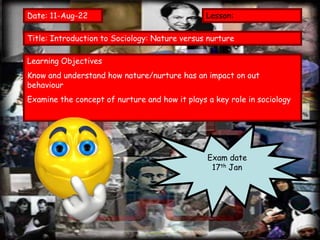
SociologyExchange.co.uk Shared Resource
- 1. Date: 11-Aug-22 Learning Objectives Know and understand how nature/nurture has an impact on out behaviour Examine the concept of nurture and how it plays a key role in sociology Exam date 17th Jan Title: Introduction to Sociology: Nature versus nurture Lesson:
- 2. Starter: Think of the things that we inherit as humans. E.g. Eye colour, height etc. Make a list of these.
- 3. • The Bobo doll experiment • Bandura hoped that the experiment would prove that aggression can be explained, at least in part, by social learning theory. The theory of social learning would state that behaviour such as aggression is learned through observing and imitating others Is our behaviour Taught or part of our nature?
- 4. • Nature: what we are born with • Nurture: part of our upbringing Key terms?
- 6. • In this experiment three groups of children saw a film which showed the adult attacking an inflatable doll with a stick. The doll was thrown across the room, sat on, punched and kicked. Bandura provided three alternative endings to the film: • Group A - Saw only the doll being hit. Group B - Saw the adult being praised and rewarded for hitting the doll. Group C - Saw the adult being punished for hitting the doll. • When the children had seen the film, they were given the same doll. Bandura observed their behaviour which showed that groups A and B imitated the aggressive behaviour they had witnessed, while group C were less aggressive. The experiment
- 7. • Bandura found that the children exposed to the aggressive model were more likely to act in physically aggressive ways than those who were not exposed to the aggressive model. For those children exposed to the aggressive model, the number of imitative physical aggressions exhibited by the boys was 38.2 and 12.7 for the girls. Results
- 8. 1. Is violence part of nature? 2. Can violent/aggressive behaviour be learnt from video games? 3. Does this alter behvaiour? Implications
- 10. • George was a thirteen year old from a middle class family in America • He was obsessed with Grand theft Auto • One day he decided to go into his high school gun down members of his class. • His family said he showed no signs of aggressive behaviour prior to this 1. What does this case teach us about the effect of the environment on a person? 2. Is this case study enough to show that behaviour is learnt rather than part of our nature? Study
- 11. 1. Wild Peter 2. Victor, The Wild Child of Aveyron 3. Kaspar Hauser 4. The Indian Wolf-Girls 5. John Ssabunnya 6. The wild boy of Hesse Feral children
- 12. 1. Outline the case study 2. What the case study show about human behaviour? 3. Is human behaviour nature or nurture? Give reasons for your answer? Feral children